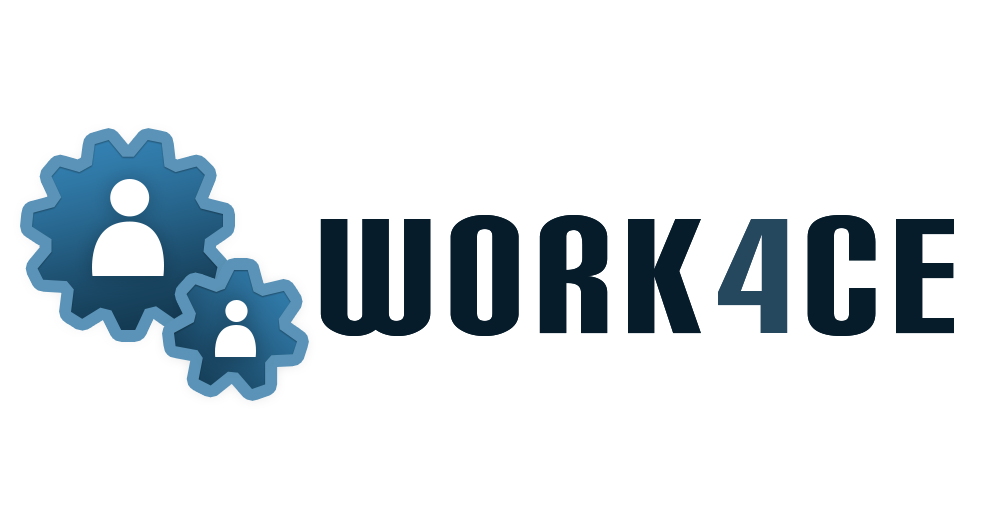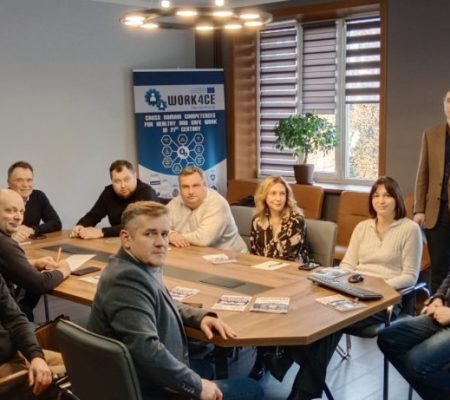WORK4CE Pilot Teaching in Baku
Summary
Welcome to the hybrid pilot teaching within the within the framework of the Erasmus+ CBHE project Cross-domain competences for healthy and safe work in the 21st century 619034-EPP-1-2020-1-UA-EPPKA2-CBHE-JP [WORK4CE].
Pilot teaching was provided to students from Azerbaijan University of Architecture and Construction (AzUAC); Azerbaijan State University of Oil and Industry (ASOIU) and Academy of the State Customs Committee of Azerbaijan (ASCCA) by the lecturers from partner universities:
- Galyna Tabunshchyk (NUZP)
- Kanan Hasanov (AzUAC)
- Carolina Cruz (UPV/EHU)
- Jon Aretxaga (UPV/EHU)
- Dino Schoenberg (FH Dortmund)
- Peter Arras (KU Leuven)
- Tegoeh Tjahjowidodo (KU Leuven)
- Elvin Alirzayev (ASCCA)
Pilot teaching contains a series of advanced courses on a range of topics. It provided a unique platform for sharing innovative ideas and practices, facilitating dialogue between educators, students.
- Digital Twinning in Mechanical Design (Dr. Peter Arras): Participants explored the creation of digital replicas of physical systems, crucial for enhancing design processes and lifecycle management in engineering.
- Maintenance and Industry 4.0 (Professor Galyna Tabunshchyk): This lecture focused on the integration of smart technologies into maintenance practices, highlighting the transformative impact of Industry 4.0.
- Designing the Digital Transformation Journey with Maturity Models (Professor Dr. Dino Schoenberg): The course offered insights into assessing organizational digital maturity, providing frameworks to support digital transformation strategies.
- Tools for Assessing the Impact of Projects on Sustainability (Dr. Carolina Cruz): Attendees learned methodologies for evaluating the sustainability impacts of projects, crucial for aligning with global sustainable development goals.
- Economic Evaluation of Projects (Jon Aretxaga): This session emphasized the importance of economic evaluation techniques in project management, fostering informed financial decision-making.
- Embedded Systems (Asif Ganbayev): The course covered the design and implementation of embedded systems, underscoring their role in enhancing the functionality and efficiency of modern technologies.
- Green Transportation (Customs) & Government Policy (Elvin Alirzayev): Participants examined how government policies and customs regulations are paving the way for sustainable transportation solutions.
Contact
Galyna Tabunshchyk galina.tabunshchik@gmail.com
News & Events
- |
- News
As part of pilot training under the Erasmus+ KA2: Capacity Building in Higher Education “Cross-domain
Funded by

Agenda
10:00 – 11:00
Meeting with a Rector of Azerbaijan University of Architecture and Construction
11:00 – 11:30
Presentation of equipment, laboratory. Demonstration of space allocated for the project related equipment (Sarkhan Talibzada)
12:00 – 13:20
Prof Tegoeh Tjahjowidodo: · A Cloud-Based Simulation using Machine-Learning and Stochastic Process Modelling Approaches for Condition Monitoring in Manufacturing
13:20 – 13:40
Lunch
13:40 – 15:00
Dr ing Peter Arras: · Digital twinning in mechanical design
15:10 – 16:30
Prof. Galyna Tabunshchyk: · Maintenance and Industry 4.0.
16:40 – 18:00
Prof. Dr. Dino Schoenberg: · Designing the Digital Transformation Journey with Maturity Models
The objective of the round table “Work4CE 4.0: Bridging Education and Industry for the Future” is to share experiences and best practices from European universities in integrating Work 4.0 concepts into education, and brainstorm practical strategies for incorporating these innovations across all subjects and faculties within Azerbaijani universities, particularly focusing on interdisciplinary approaches and industry collaboration.
Agenda for the Panes Discussion
11:30 – 13:00
Welcome and Introduction (10 minutes)
- Brief overview of the event’s goals and the importance of Work 4.0 in modern education.
- Introduction of the speakers: Peter Arras (KU Leuven), Galyna Tabunshchyk (Zaporizhzhia Polytechnic National University), Carolina Cruz (University of the Basque Country), and Prof. Schoenberg & Thorsten Ruben (Dortmund University).
Keynote Presentations (60 minutes total, 15 minutes each)
- Peter Arras (KU Leuven) – “Integrating Work 4.0 and Digital Skills into Engineering and Science Curricula”
- Galyna Tabunshchyk (Zaporizhzhia Polytechnic National University) – “Work4CE Project Overview & Best Practices”
- Thorsten Ruben (Dortmund University) – “Project- and Workshop-based Didactic Formats for Industry Cooperation: Examples from EuroPIM and Master Block Weeks”
- Carolina Cruz (University of the Basque Country) – “University-Business Collaboration: Insights from the University of the Basque Country “
Presentation by 4SIM Azerbaijan (10-15 minutes)
- Overview of 4SIM Azerbaijan’s role in promoting Industry 4.0 in Azerbaijan, including current initiatives, partnerships with educational institutions, and future goals.
Panel Discussion and Brainstorming Session (40 minutes)
- Moderated discussion on innovative ways to enhance collaboration between universities and businesses, led by Peter Arras & Galyna Tabunshchyk.
Closing Remarks (30 minutes)
- Summary of key points discussed and the roadmap for enhancing collaboration between universities and businesses.
13:00 – 14:00
Lunch
Agenda for the Pilot Teaching
15:10 – 16:30
Dr. Carolina Cruz: Tools for assessing the impact of projects on sustainability
16:40 – 18:00
Jon Aretxaga: Economic evaluation of projects
10:00- 10:30
Meeting with the ASCCA Rector and staff
10:30 – 12:00
Dr. Carolina Cruz: Impact of projects on sustainability
12:10 – 13:10
Asif Ganbayev: Embedded Systems
13: 20- 14:20
Lunch
14:20 – 16:00
Jon Aretxaga: Economic evaluation of project
16:10 – 17:30
Elvin Alirzayev: Green Transportation (Customs) & Government Policy
13:40 – 15:00
Lecture for MBA students
Dr. ing. Peter Arras: Digital twinning in mechanical design
16:00 – 17:00
Meeting with International relations department of AzUAC (Peter Arras)
Lectures information
Jon ARETXAGA, UPV/EHU
Peter ARRAS, KU Leuven
Dr ing. Peter Arras, Prof h.c. is senior lecturer at KU Leuven in the faculty of engineering technology. He teaches in bachelor and master degree courses in design methodology, strength of materials and numerical methods for design (FEA, CAE). He obtained a Phd in material sciences teaching in UKF (University Constantine the philosopher, Nitra , Slovacia). He is program director for the degree studies in electro-mechanical engineering. Peter Arras is in charge of international relations for the department of engineering technology at campus De Nayer. He is member of the faculty expert board on international relations. · 10+ years’ professional project management experience as project manager and contact for educational European projects (tempus, KA2, Erasmus mundus, KA1). · 14 years of being coordinator for retraining programs for longtime unemployed. · 40+ peer-reviewed scientific publications: http://lirias.kuleuven.be/cv?Username=U0069202
Carolina CRUZ- VILLAZON, UPV/EHU
Kanan HASANOV, AzUAC
Galyna TABUNSHCHYK NUZP
Tegoeh TJAHJOWIDODO
Manufacturing Processes and Systems (MaPS), KU Leuven, De Nayer (Sint-Katelijne-Waver) Campus
Prof. Dr. Dino SCHÖNBERG
Professorship for: Business administration, especially business informatics in FH Dortmund
Thorsten RUBEN
Lectures and E-Learning Content
M01. Data Analytics for Work
M02. Digital Technologies
M03. Industry 4.0
- Consider strategies to incorporate Industry 4.0 technologies when getting connected.
- Reflect on how Industry 4.0 comes into view in the case study.
- Suggest technologies like IOT, Digital twins for integration in the workspace design. (How to capture data, how to use data (e.g. environmental data), simulation of office capacity, time zones in distributed teams…)
- Consider a practice for digital and physical rapid prototyping for understanding of products at different locations (additive manufacturing).
M04. Distributed Teams
M05 Work 4.0
M06 Safe Workplaces
M07. Managing Digital Change
- Digital strategy and vision:
- Leadership and Stakeholders engagement:
- Change Management and Communication:
- Digital skills and training:
- Data and Security Governance:
- Technology Infrastructure and Integration:
- User Experience and Customer-Centricity:
- Agile and Iterative Approach:
- Risk Management and Contingency Planning:
- Measuring and Monitoring Perf
- Collaboration and Partnerships:
M08. Life Cycle Thinking and Sustainable Management
M09. Developing Digital Business Ecosystems
- Explore opportunities for collaboration and knowledge sharing among distributed teams.
- Propose strategies for building a digital business ecosystem within the market research company, fostering collaboration both internally and externally.
- Digital Platforms and Tools: Identify digital platforms and tools that can facilitate collaboration and knowledge sharing.
- Consider project management software, online collaboration platforms, and data sharing tools to create a connected ecosystem.
- Partner Engagement: Develop strategies to engage external partners and stakeholders within the digital business ecosystem.
- Explore possibilities for joint ventures, strategic alliances, and knowledge exchange to enhance innovation and collaboration.
- Data Privacy and Security: Address data privacy and security concerns within the digital business ecosystem.
- Implement measures such as secure data transfer, encryption, and access controls to protect sensitive information and ensure compliance with regulations.
- Continuous Learning and Development: Promote continuous learning and development within the digital business ecosystem.
- Establish mechanisms for sharing best practices, conducting virtual training sessions, and fostering a culture of innovation and growth


